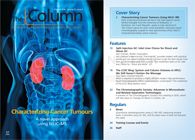Quantifying Methylergonovine Using LC–MS–MS
A team of researchers from China and the USA has developed a LC–MS–MS method for quantifying methylergonovine, a semi-synthetic ergot alkaloid used for the treatment and prevention of postpartum haemorrhage in human plasma.
Photo Credit: SCIEPRO/Getty Images

A team of researchers from China and the USA has developed a liquid chromatography coupled to tandem mass spectrometry (LC–MS–MS) method for quantifying methylergonovine (ME), a semi-synthetic ergot alkaloid used for the treatment and prevention of postpartum haemorrhage (PPH), in human plasma.1 PPH results in 44,000 to 86,000 deaths each year around the world, making it the leading cause of death during pregnancy.
ME has been used more recently in the control of refractory headaches and can be used as a chemosensitizer for cancer. However, this alkaloid sometimes causes elevated blood pressure, and so quantification in biological matrices is necessary.
The team extracted ME from 500-μL plasma samples using liquid–liquid extraction under alkaline conditions and detected using positive multi-reaction-monitoring mode (+MRM) mass spectrometry (MS). The method was validated according to US FDA guidelines and covered a working range from 0.025 to 10 ng/mL with a lower limit of quantification (LLOQ) of 0.025 ng/mL.
The team concluded that they have developed a rapid, sensitive, selective, and accurate LC–MS–MS method, which was successfully applied to a clinical pharmacokinetics study in female volunteers. They determined that it is suitable for both preclinical and clinical studies on ME. - K.M
Reference
- Hongxiang Lou et al., Journal of Chromatography B1011, 62–68 (2016).

Determining the Effects of ‘Quantitative Marinating’ on Crayfish Meat with HS-GC-IMS
April 30th 2025A novel method called quantitative marinating (QM) was developed to reduce industrial waste during the processing of crayfish meat, with the taste, flavor, and aroma of crayfish meat processed by various techniques investigated. Headspace-gas chromatography-ion mobility spectrometry (HS-GC-IMS) was used to determine volatile compounds of meat examined.
University of Tasmania Researchers Explore Haloacetic Acid Determiniation in Water with capLC–MS
April 29th 2025Haloacetic acid detection has become important when analyzing drinking and swimming pool water. University of Tasmania researchers have begun applying capillary liquid chromatography as a means of detecting these substances.
Using GC-MS to Measure Improvement Efforts to TNT-Contaminated Soil
April 29th 2025Researchers developing a plant microbial consortium that can repair in-situ high concentration TNT (1434 mg/kg) contaminated soil, as well as overcome the limitations of previous studies that only focused on simulated pollution, used untargeted metabolone gas chromatography-mass spectrometry (GC-MS) to measure their success.

.png&w=3840&q=75)

.png&w=3840&q=75)



.png&w=3840&q=75)



.png&w=3840&q=75)











